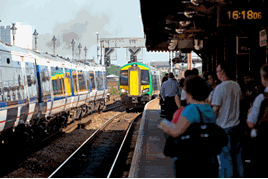Thus, on the one hand, if it is agreed that local control brings better rail services faster and thus economic growth faster, devolution needs to happen as soon as possible. But on the other hand, rushing risks a collapse of the process due to lack of capability.
The next London Midland franchise contract will therefore need to be flexible enough to respond to economic needs. Given the present DfT policy, it is likely to last between seven and nine years, in principle taking it to October 2026 at the latest. But that date is not yet fixed, while the overarching event that will determine the end-date will be the completion of the High Speed 2 line into Birmingham Curzon Street station (presently set for 2026).
It is WMR’s view that the West Midlands devolved franchise needs to be in place by then, so that the tremendous changes in local services needed to provide the required connectivity into HS2 can be made, and advantage taken of the released WCML capacity, without the distraction of ownership or management changes.
Toby Rackliff, WMITA Rail Policy and Strategy Manager, notes that WMR’s ambition goes further than just taking over London Midland’s Birmingham area local services. Eventually, it would like some trains currently run by Chiltern and CrossCountry and which are in the same mould (such as Birmingham-Leamington Spa and to Nuneaton/Leicester) to be remapped into the West Midlands standalone franchise.
The current services between Derby and Birmingham are considered an anomaly. These long-distance trains also serve local needs between those two cities, and are all provided by CrossCountry, with the fares, frequency, train provision and stopping patterns all specified accordingly.
Clearly there is a need for a frequent stopping service along the corridor, particularly to serve the growing towns of Burton and Tamworth (and potential new local stations), yet the journey from Nottingham to Birmingham should also be speedier to cater for longer-distance business needs.
The effects of the long-distance fare structure, generally some 25% above that in other parts of the Birmingham travel-to-work area, is highlighted at Tamworth. The high fare to Birmingham and the cost of parking (£630 for an annual season based on the WCML market) encourages passengers to drive to Four Oaks, unnecessarily throwing more cars onto the local roads and into Four Oaks station’s free (and being extended) car park.
A suitable time to address this situation could be in the run-up to the next CrossCountry franchise, currently set to start in October 2019. Obviously, WMR’s ambitions need to be carefully managed, and matched with capability and political policy.
By early September, the West Midlands Rail Leaders Group was already meeting regularly. Consisting of politicians from each of the 14 constituent areas, the group brings together people with very different political views but who are united around a common strategy. And while Birmingham clearly dominates in terms of the proportion of rail patronage that passes through the city’s stations, the Leaders Group is based on the simple one authority one vote principle.
The next step in this process will be to form a limited company (West Midlands Rail Limited) in December 2015, with each of these Leaders a director, and with the Board particularly charged with maintaining good political relationships, especially with the Government.
“We have the political will and political strength to see this through,” Holmes tells RAIL. “This is fundamentally important, for without this commitment devolution won’t happen. We won’t be able to give confidence to the Secretary of State that we can control the process.”
Rackliff explains that this devolution is “all about specifying and delivering rail services in line with local requirements, and is closely allied to the Government’s Localism agenda and to our aims for economic growth”, with the ability of rail to affect local growth now well understood and recognised.
Adds Holmes: “It is extremely effective on Merseyside, and in London with London Overground.”
It is also important that the railway keeps pace with developments in the wider economy, such as changes to the nighttime and leisure sectors. For example, in general the railway timetable has barely changed from the days when Sunday mornings were for church or for tending the garden, rather than shopping or leisure trips. Thus it can still be difficult for shop workers to get to their places of work by train in time for Sunday morning opening.
Similarly, while running trains right through the night might be going a bit too far, services do tend to stop well before the theatre and restaurant goers are ready to head home from city centres. These are the kinds of areas that local management can address far more easily than centralised control.
The West Midlands Rail area also encompasses towns such as Walsall, which should be seen as an important centre in its own right, worthy of more extensive train services not just to Birmingham, but also to other regional centres such as Stafford and Wolverhampton. This is the kind of ‘quick win’ that WMR is hoping to negotiate into the new franchise starting in 2017, as the start of bringing better services and economic growth to the entire West Midlands area.
















Login to comment
Comments
No comments have been made yet.